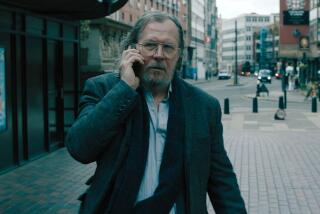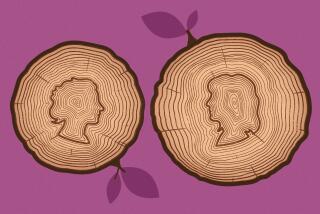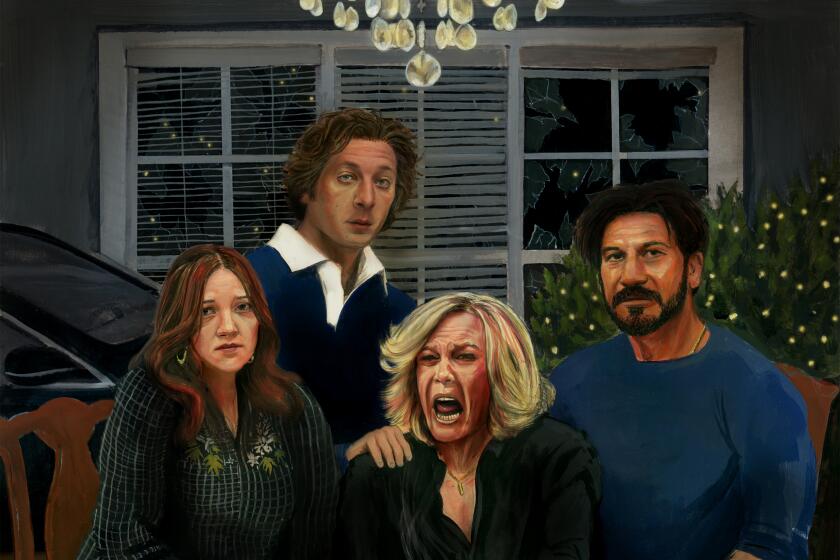A chat with the stars and director of ’45 Years’
In an awards season full of bear maulings and Martian catastrophes, “45 Years” is striking in its quiet intensity. Andrew Haigh’s portrait of a long marriage thrown into subtle chaos by a revelation from the past stars Charlotte Rampling and Tom Courtenay as a husband and wife whose nagging doubts take root as their anniversary celebration approaches. With much of the scripted dialogue, especially Rampling’s, pared in editing, it becomes a study of bodies and faces and of the damage wrought by things too long left unsaid.
This is a movie about people who’ve been together longer than you’ve been alive. How do you get inside their heads as a 42-year-old?
Andrew Haigh: Maybe it’s just because I am someone that always does think about the things I’ve chosen to do. I can’t help that. I think I’ve been like that since I was 5, and it’s only going to get stronger as I get older. Some people repress all those fears and doubts, and I’m always very aware of them. As you get older, you don’t want to deal with the fact that maybe you’ve made the wrong decisions. My dad did a job for 40 years, and I hate the idea that he might look back and think: “Do you know what? I shouldn’t have done that job.” So it makes sense that people stick by their decisions, even if they’re the wrong decisions.
Tom Courtenay: I do have a tendency to regret some decisions — also some things that happened, though that’s fair enough. But that’s pointless. Stupid.
Were you surprised how well Andrew could imagine these characters, given his age?
Charlotte Rampling: No, because either you understand or you don’t. You either get things or you don’t. You either have feelings about things or you don’t. It’s not about age or experience, especially from the artistic point of view. Artists quite often have an extremely mature vision of things; it’s like they’ve lived other lives. They know, they have a feeling for things. It’s not about having lived them, they just know about them. And that’s very much Andrew. He didn’t have to be our age to understand what goes on.
See more of Entertainment’s top stories on Facebook >>
Courtenay: I thought it was a wonderful image of a man my age looking back on his lost youth. Just brilliant. With the script came two pictures: one of mountains, covered in snow; one of flat Norfolk reeds. And I thought that added to the sense that this was something exciting. It added to, “Gosh, the lad who wrote this knows something.”
Charlotte Rampling and Tom Courtenay are British cinema icons, associated with the Swinging London of the films “Georgy Girl” and the angry young man of “The Loneliness of the Long Distance Runner.” Was that part of the appeal of casting them, even though those iconic figures are nothing like their characters in “45 Years”?
Haigh: It’s so fascinating to me to cast two actors who are playing characters looking back at their lives when the audience has an idea of those actors’ lives from their screen roles. There’s a scene when Charlotte’s talking to Tom about what they were like dancing together when they were young; [his character] Geoff had a cigarette hanging out of his mouth, and to me, that was just Tom in “Billy Liar” and “The Loneliness of the Long Distance Runner.” It’s that version of the character.
Rampling: You could have thought it’s not going to work, because people are going to have a backstory to these two people completely not corresponding to who they are in the film. But it’s interesting when you meet someone up years later, and you’ve sort of been with them through film. There was something right about it, something that worked on that level. It was something that made sense.
Charlotte, your performance is full of moments, like the way you use your hands in the last scene, that feel both precise and uncalculated, as if you’re able to make decisions as an actor and forget them as the character. Is that something that comes with experience?
Rampling: From my point of view, you are absolutely in the present moment. You are living it. I am that woman feeling what she is feeling, and all the body language is what it would be. It’s not an intellectual thing at all. Why I like exploring women like Kate and having a chance on screen to be able to put that across is I know what that’s all about. I know those feelings, so I don’t have to do anything: I just bring them up, and they just come right out. I know what she’s going through — and in a sense, we all do, but I know how to show it. It’s fine-tuning, like if you’re sculpting a piece of wood and you get it smoother and smoother and smoother until you don’t see the lines anymore. You just have the essence of what it is.
Haigh: It’s very interesting how different actors work in different ways. Charlotte absolutely wants to work in the moment. She doesn’t want to rehearse, ever. She doesn’t even want to read the lines before we start. Nothing. Zip.
Courtenay: She’s done only films, you see. I’m a stage actor. I complained a lot, but I don’t think Andrew took any notice. But that’s me, and I like to get cross. Also, I love learning my lines. I feel the more they’re in me, the more I can sound as if I’m making them up. So we’re slightly at odds, Charlotte and I, but I think sometimes the tension worked very well.
More to Read
From the Oscars to the Emmys.
Get the Envelope newsletter for exclusive awards season coverage, behind-the-scenes stories from the Envelope podcast and columnist Glenn Whipp’s must-read analysis.
You may occasionally receive promotional content from the Los Angeles Times.






